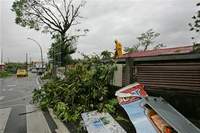Hurricane Dean to become Category 5 storm
Powerful Hurricane Dean hit the eastern Caribbean region, damaging buildings, flooding streets and killing at least three. Winds reached 150 mph (241 kph) as the hurricane moved on a collision course with Jamaica and Mexico's Yucatan Peninsula, where it is expected to become a Category 5 storm.

The Atlantic season's first hurricane built to a powerful Category 4 storm Friday night after crossing over the warm waters of the Caribbean. The National Hurricane Center in Miami forecast that Dean would become a Category 5 storm - with winds surpassing 155 mph (249 kph) - as it approaches Yucatan on Monday.
By Wednesday, it could be threatening the United States.
The immediate threat, however, comes Saturday as the storm passes south of Hispaniola, the island shared by the Dominican Republic and Haiti - both particularly prone to devastating floods.
Haitian authorities issued an alert for coastal communities and ordered fishing boats to stay ashore until after the weekend. Prime Minister Portia Simpson-Miller of Jamaica - where a direct hit is expected Sunday - ordered shelters opened across the island and called for a halt to campaigning for the Aug. 27 elections.
"Let us band together and unite in the threat of this hurricane," Simpson-Miller said.
Earlier Friday, Dean roared across small eastern Caribbean islands.
In tiny St. Lucia, fierce winds tore corrugated metal roofs from dozens of homes and the pediatric ward of a hospital, whose patients had been evacuated hours earlier. Police spokeswoman Tamara Charles said a 62-year-old man was swept away and drowned when he tried to retrieve a cow from a rain-swollen river.
In Dominica, a woman and her 7-year-old son were killed when a rain-soaked hillside gave way and crushed the home where they were sleeping, said Cecil Shillingford, the national disaster coordinator.
French authorities on the adjacent island of Martinique said a 90-year-old man died of an apparent heart attack during the storm but he was alone and already dead when emergency medical personnel arrived and it was unclear whether Dean was a factor.
People in Martinique, St. Lucia and Dominica mostly stayed indoors Friday while Dean's remnants pounded the islands with heavy rain and authorities tried to assess damage.
Many who did venture out said they were surprised the islands seem to have gotten off fairly easy.
"I did not sleep at all last night and was a little worried that the roof of my house would be blown off with all that wind. Thank God it did not," Gwenie Moses said as she checked her small tin-roofed house in Dominica's capital, Roseau.
Dominica's government later reported at least 150 homes were damaged.
In St. Lucia, the storm scattered boulders from the sea onto downtown streets and knocked down trees. With utility poles downed, the power company turned off electricity across the island to prevent people from being electrocuted.
At 0600 GMT (2 a.m. EDT), Dean was centered about 700 miles (1,125 kilometers) east-southeast of Kingston, Jamaica and about 240 miles (385 kilometers) south of San Juan, Puerto Rico. It was moving west at 18 mph (30 kph). The storm's maximum sustained winds were near 150 mph (241 kph).
Dominica, which lies north of Martinique, had minor flooding, a few downed fences and trees and battered banana crops, one of the island's main exports.
At Ross University School of Medicine on Dominica, about 80 medical students, mostly from the U.S., and 20 staff and faculty members spent the night watching movies, playing games or sleeping on the floor between desks in a concrete building that was converted into a shelter.
On Martinique, an overseas department of France, many homes lost roofs, leaving people's belongings exposed to driving rain that fell even hours after the brunt of the storm had passed.
"We don't have a roof ... everything is exposed. We tried to save what we could," said Josephine Marcelus in the northern town of Morne Rouge. "We sealed ourselves in one room, praying that the hurricane stops blowing over Martinique."
Nearly 100 percent of Martinique's banana crops and 70 percent of its sugar cane was destroyed in the hurricane, said Christian Estrosi, France's junior minister for overseas territories.
It was too early to tell whether the storm would eventually strike the United States, but officials were gearing up for the possibility.
"It's so far out, but it's not too early to start preparing," said Katherine Cesinger, a spokeswoman for Texas Gov. Rick Perry.
Energy futures rose Friday on news that Dean could hit the Gulf of Mexico, which produces roughly 25 percent of America's oil and 15 percent of its natural gas. Royal Dutch Shell PLC said it would evacuate 275 nonessential personnel from the Gulf, adding to the 188 who left earlier this week before another tropical storm struck Texas.
Subscribe to Pravda.Ru Telegram channel, Facebook, RSS!





